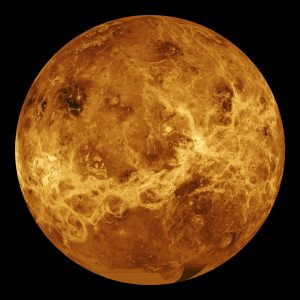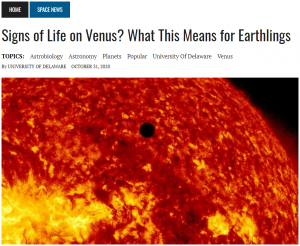Whenever I find myself reading through the science headlines of any mainstream news website, it is not uncommon to find an article with a clickbait title like “Signs of Life Found on Venus”. To the average reader, this seems like huge news, as it’s not every day that we discover alien life in our own solar system. But, like many headlines today, this is far from the truth that this scientific discovery is presenting.
What was actually discovered?
While it is true that recently a team of astronomers from around the globe announced the discovery of a rare molecule called phosphine in the clouds of Venus, this does not mean that life as we know it was found on Venus. This recent discovery showed that in the higher atmosphere of Venus, there were detections of molecules of phosphine at a rate of twenty phosphine molecules per billion molecules in the atmosphere. The reason this is interesting is that phosphine (PH3) is mainly produced on earth by chemical reductions of phosphate in organic matter such as bacteria that have died and are decaying.
This discovery showed that somehow, there are chemical signs of decaying organic matter on Venus despite its harsh acidic atmosphere and high planetary temperatures. Here is a scientist from the Royal Astronomical Society detailing the findings in full:
What is the media getting wrong?
Even though scientists are extremely excited about this discovery, it’s not because they have definitively found life outside of our planet. Rather, scientists are excited about this discovery because it raises a lot of questions about how phosphine got to where it is on Venus. This is an important scientific discovery because it opens doors to new areas of research that can be done on determining where the phosphine in Venus’ atmosphere comes from.
The fact that there is this huge piece of evidence that goes against what we know regarding phosphine and conditions for life to exist is a huge stepping stone towards learning more about both subjects.

Photo of Venus. Photo Credit: NASA/JPL
So what other explanations are there?
There are lots of alternative explanations for where this phosphine could have come from besides organic life. For example, it’s possible that there is some unknown chemical process occurring on Venus that is creating these phosphine molecules. But even after extensive scientific review, astronomers are still unsure of where these molecules are coming from. So, unfortunately, we will not know the truth about these molecules’ origin until we go out and discover it for ourselves.
Until we have real, solid, observable evidence that the phosphine molecules we are discovering in our solar system (along with any other biomarkers) are actually being created by alien life forms, don’t believe any headlines you see reading “Signs of Life Found In Space!”, as they really should read “Potential Biomarker Molecules Found in the Upper Atmosphere of Venus”!
- Written by Ryan Reiss, Nov. 2020



2 responses to ““Signs of Life Found in Space?!?” – A Media Misnomer”